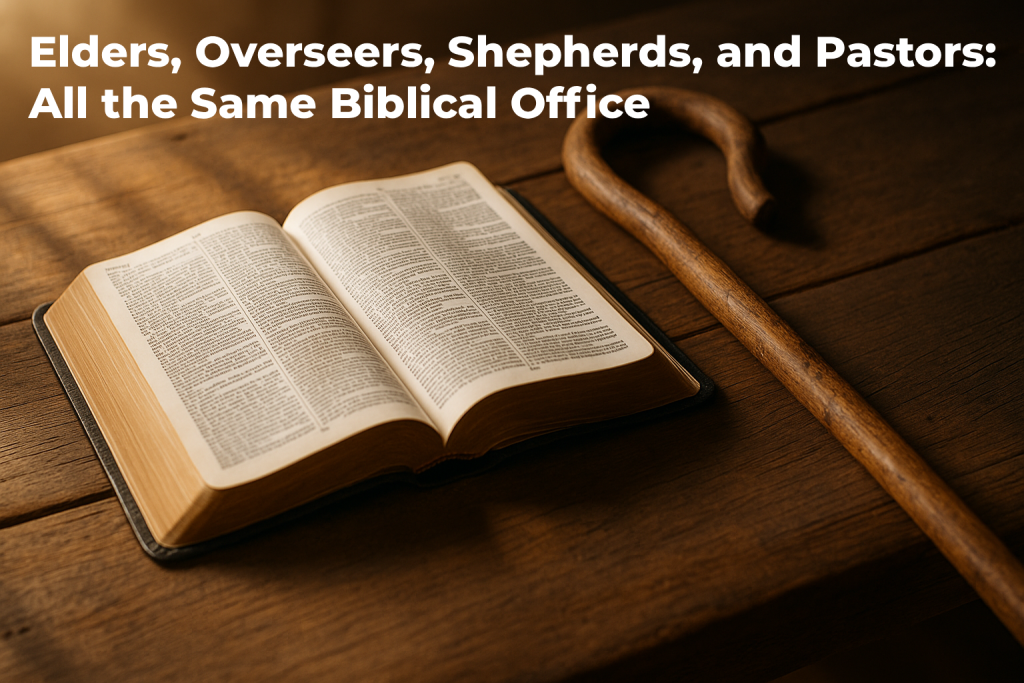
Clearing Up the Confusion
If you walk into ten different churches today, you might hear ten different leadership titles: Lead Pastor, Executive Pastor, Youth Pastor, Senior Pastor, Worship Pastor, Teaching Pastor, Associate Pastor, Campus Pastor, Church Plant Pastor, and on and on it goes. Titles like these have become so common that most people assume each represents a separate office or level of authority. But when we turn to Scripture, that assumption immediately falls apart.
The New Testament presents a simple, unified pattern for church leadership. The words elder, overseer, shepherd, and pastor are not four distinct roles. They are four descriptions of the same biblical office. Each one highlights a different aspect of what godly leadership looks like within Christ’s church.
This isn’t just a matter of vocabulary. When we misunderstand the nature of church leadership, we risk reshaping God’s design for how His people are led, fed, and protected. Getting this right isn’t about tradition or preference; it’s about faithfulness to what God has clearly revealed.
A Look at the Original Biblical Koine Greek Words
Elder (Presbuteros)
The word “elder” in Koine Greek simply means “older one,” and in a biblical sense, it refers to maturity—not necessarily age, but spiritual maturity and wisdom. In Acts 14:23, we’re told, “And when they had appointed elders for them in every church, with prayer and fasting they committed them to the Lord in whom they had believed.” Elders were appointed to lead each congregation.
The emphasis here is on character. Elders are men who have walked long enough with Christ to be examples of faith and integrity. They’re not elevated because of their charm, skill, or charisma, but because they’ve proven faithful in both life and doctrine.
Overseer (Episkopos)
The term Overseer (sometimes translated “bishop”), or Episkopos (ἐπίσκοπος), means one who watches over or guards. It focuses on the function of the elder rather than his maturity. It means “one who sees over.” Paul writes in Philippians 1:1, “To all the saints in Christ Jesus who are at Philippi, with the overseers and deacons.”
The overseer ensures that the flock is fed sound teaching, that sin is addressed biblically, and that the church remains focused on Christ. In 1 Timothy 3:1-2, Paul says, “If anyone aspires to the office of overseer, he desires a noble task. Therefore, an overseer must be above reproach.” The job is not about managing budgets or running programs. Instead, it is about spiritual oversight and faithfully guarding the souls of God’s people.
Shepherd or Pastor (Poimēn)
The word “pastor” comes from the Latin for “shepherd,” and it’s where we get the modern term “pasture,” where flocks of animals are. The Koine Greek “poimēn” (ποιμήν) is the same. It’s used only once as a noun in the New Testament, in Ephesians 4:11: “And he gave the apostles, the prophets, the evangelists, the shepherds and teachers.” The verb form, however, appears often, and it literally means “to tend or feed sheep.”
That image is intentional. Shepherds care for living, breathing, needy creatures. They feed, lead, protect, and sometimes correct the flock. When Jesus restored Peter after his denial, He told him three times: “Feed my lambs,” “Tend my sheep,” and “Feed my sheep” (John 21:15-17). That is what pastoring is: nourishing God’s people with His Word and caring for them with love and truth.
Scripture Shows They’re the Same Office
The Bible never separates these titles into different levels of leadership. Instead, it uses them interchangeably.
In Acts 20, Paul calls the elders of the Ephesian church to meet him. Luke writes, “Now from Miletus he sent to Ephesus and called the elders of the church to come to him” (Acts 20:17). A few verses later, Paul tells these same men, “Pay careful attention to yourselves and to all the flock, in which the Holy Spirit has made you overseers, to care for [or shepherd] the church of God, which he obtained with his own blood” (Acts 20:28).
In one passage, Paul calls them elders, overseers, and commands them to shepherd. Those are three different Greek words describing the same men and the same responsibility.
Peter does the same thing. He writes, “So I exhort the elders among you, as a fellow elder and a witness of the sufferings of Christ… shepherd the flock of God that is among you, exercising oversight, not under compulsion, but willingly, as God would have you” (1 Peter 5:1-2).
And in Titus 1, Paul instructs Titus, “This is why I left you in Crete, so that you might put what remained into order, and appoint elders in every town as I directed you… For an overseer, as God’s steward, must be above reproach” (Titus 1:5-7). Again, elder and overseer are used interchangeably.
In every case, the Bible paints one office of spiritual leadership, described by multiple words that highlight maturity (elder), function (overseer), and care (shepherd).
Two Biblical Offices: Elders and Deacons
It’s also worth noting that the New Testament recognizes only two ongoing offices within the local church: elders and deacons. Elders are responsible for the spiritual leadership and shepherding of the congregation, while deacons handle the practical and physical needs of the church body.
We see this distinction clearly in Philippians 1:1, where Paul greets “the overseers and deacons.” The elders guide, teach, and protect, while deacons serve and support the ministry by meeting tangible needs. Both roles are vital, but they are not the same. Deacons serve so that elders can devote themselves fully to prayer, teaching, and the care of souls. When both offices function biblically, the church flourishes under godly order and unity.
The Role and Responsibility of a True Elder
When we put the biblical pieces together, we get a clear picture of what God expects from church leaders.
Elders are called to teach sound doctrine and protect against falsehood. Titus 1:9 says, “He must hold firm to the trustworthy word as taught, so that he may be able to give instruction in sound doctrine and also to rebuke those who contradict it.” Elders must not only feed the sheep but also guard the gate.
They are to lead and protect the flock. In Acts 20:29-30, Paul warns, “I know that after my departure fierce wolves will come in among you, not sparing the flock.” The elder’s role includes vigilance—watching over the souls entrusted to him.
They are also called to model godly living. Peter writes that elders should lead “not domineering over those in your charge, but being examples to the flock” (1 Peter 5:3). True leadership flows from humility and service, not position or status.
And they are to pray for and care for the needy. James 5:14 says, “Is anyone among you sick? Let him call for the elders of the church, and let them pray over him.” Elders are to be men who intercede for others, standing between the people and their pain with compassion and faith.
Where the Modern Church Often Goes Wrong
Somewhere along the way, many churches drifted from this simple biblical model. Instead of a plurality of godly elders shepherding the flock together, churches often function like corporations, with one CEO-style pastor at the top and several “assistant pastors” or staff roles beneath him.
There’s nothing wrong with having staff or ministry leaders. The problem comes when we confuse titles with offices. Being hired by a church with the title “pastor” does not automatically make someone a biblical elder.
A worship leader can be an incredible blessing to a church, but leading songs on Sunday doesn’t make him a pastor in the New Testament sense. Likewise, someone might be a “worship pastor,” “pastor of technology,” or “pastor of outreach,” but if he isn’t biblically qualified, recognized by the congregation, and engaged in shepherding souls, he is not a pastor according to Scripture.
These titles often describe ministry responsibilities, not spiritual oversight. There’s a big difference between leading a ministry team and carrying the weight of shepherding God’s flock. A man can faithfully serve in many ways without occupying the office of elder.
What Makes a Legitimate Pastor or Elder
The qualifications for true elders are laid out clearly in 1 Timothy 3 and Titus 1. They must be above reproach, sober-minded, self-controlled, hospitable, able to teach, gentle, not lovers of money, and faithful in marriage and family life.
They must also be recognized and affirmed by the local church. Acts 14:23 says, “And when they had appointed elders for them in every church… they committed them to the Lord in whom they had believed.” Elders aren’t self-appointed or hired by a committee; they are called, examined, and affirmed within the local body.
Finally, they must actually shepherd people. Hebrews 13:17 says, “Obey your leaders and submit to them, for they are keeping watch over your souls, as those who will have to give an account.” That verse carries both a comfort and a warning. True pastors will one day stand before God and give an account for how they cared for His people.
A man doesn’t need a fancy title or an office in the church building to do that. But he does need a heart that reflects the Chief Shepherd.
The Biblical Model of Shared Leadership
Another key pattern in the New Testament is plurality. Every church had multiple elders leading together. In Acts 14:23, Paul and Barnabas “appointed elders for them in every church.” Philippians 1:1 greets “the overseers and deacons.” Nowhere in Scripture do we see a single man ruling a church by himself.
This structure provides balance and accountability. When leadership is shared among a group of qualified men, there’s less temptation toward pride or abuse of authority. It also protects the congregation from depending too heavily on one man’s personality or gifting.
Shared leadership is not about being on a power trip. Instead, it’s about strengthening care. God designed the church to be shepherded by a team of elders who each bring wisdom, gifts, and perspectives to the task of leading His people.
Practical Lessons for the Church Today
Churches today would be far healthier if they returned to this simple biblical model. We don’t need new titles or more layers of hierarchy. We need godly men who will humbly shepherd the flock with the Word of God in their hands and the love of Christ in their hearts.
When churches focus on titles instead of qualifications, they end up with employees, not elders. But when we emphasize biblical faithfulness, we get shepherds who feed, protect, and lead God’s people as Christ intended.
If your church calls someone “pastor,” make sure the title reflects the reality. Is he a man who meets the biblical qualifications? Does he shepherd people, teach Scripture, and live as an example of godliness? Or does the title simply describe a job function?
The church doesn’t need more executives or department heads. It needs faithful shepherds who love God, love people, and lead with humility and conviction.
Returning to God’s Design for Church Leadership
At the end of the day, the Bible couldn’t be clearer: elders, overseers, shepherds, and pastors are one and the same. Again, these aren’t separate offices or ranks, but complementary descriptions of a single calling.
This understanding doesn’t make church leadership simpler just for the sake of simplicity. It aligns the church with God’s own blueprint. When we follow His design, the result is a healthier, more accountable, more Christ-centered community.
Jesus Christ is the Chief Shepherd, and all true pastors are under-shepherds, caring for what belongs to Him. Their authority is not rooted in a title or a paycheck, but rooted in service and submission to Christ Himself.
May God raise up a generation of faithful elders/pastors who lead not because they want recognition, but because they love the flock that Jesus purchased with His own blood!

0 Comments